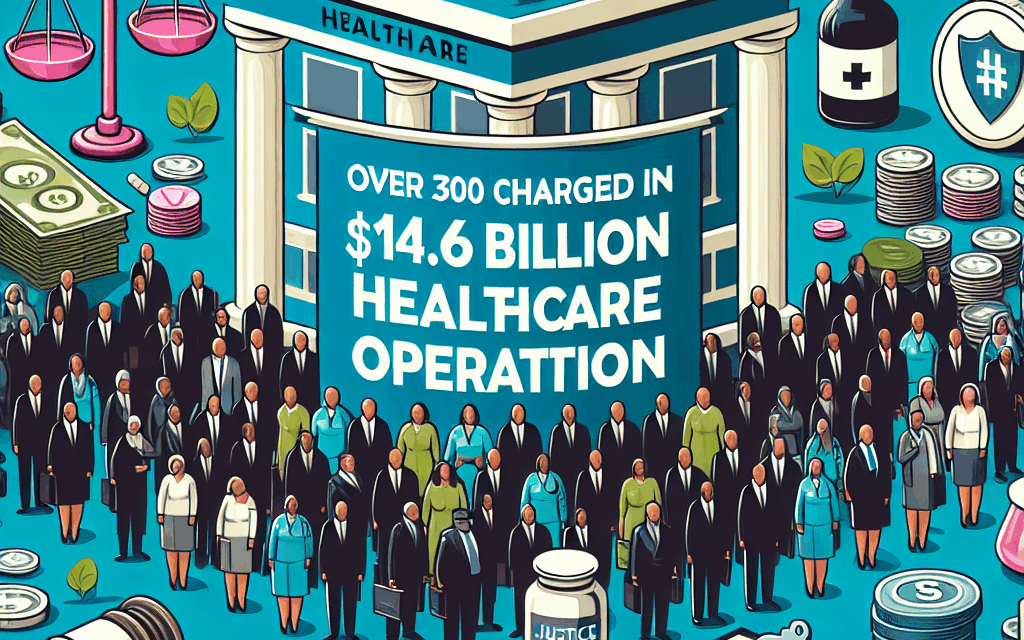Over 300 Charged in $14.6 Billion Healthcare Fraud Operation by DOJ
The healthcare sector is one of the most critical components of the American economy, yet it is also one of the most vulnerable to fraud. In a significant crackdown, the Department of Justice (DOJ) recently announced that over 300 individuals have been charged in connection with a staggering $14.6 billion healthcare fraud operation. This article delves into the details of this operation, exploring its implications, the methods employed by fraudsters, and the broader context of healthcare fraud in the United States.
The Scale of the Operation
The scale of the healthcare fraud operation uncovered by the DOJ is unprecedented. With over 300 individuals charged, including doctors, nurses, and healthcare executives, this operation highlights the pervasive nature of fraud in the healthcare system. The total amount involved—$14.6 billion—represents one of the largest healthcare fraud schemes in U.S. history.
According to the DOJ, the fraudulent activities included a wide range of schemes, such as:
- Billing for services that were never provided.
- Upcoding, where providers bill for more expensive services than were actually rendered.
- Kickbacks for patient referrals.
- Fraudulent telemedicine practices.
- Prescription drug fraud.
This operation was not limited to a single geographic area; it spanned multiple states and involved a variety of healthcare providers. The DOJ’s announcement underscores the need for vigilance and robust enforcement mechanisms to combat healthcare fraud.
Understanding Healthcare Fraud
Healthcare fraud is a complex issue that can take many forms. It not only drains resources from the healthcare system but also compromises patient care. Understanding the various types of healthcare fraud is essential for both healthcare professionals and patients.
Some common types of healthcare fraud include:
- Billing Fraud: This occurs when healthcare providers submit false claims to insurance companies or government programs like Medicare and Medicaid.
- Kickbacks: Providers may receive illegal payments for referring patients to specific services or facilities.
- Identity Theft: Fraudsters may use stolen identities to obtain medical services or prescriptions.
- Phantom Patients: Some providers bill for services rendered to patients who do not exist.
- Unnecessary Services: Providers may perform unnecessary tests or procedures to increase billing.
The consequences of healthcare fraud are far-reaching. It not only results in financial losses but also affects the quality of care that patients receive. For instance, when providers focus on maximizing profits through fraudulent activities, they may neglect the actual needs of their patients, leading to substandard care.
Case Studies of Healthcare Fraud
To better understand the implications of healthcare fraud, it is helpful to examine specific case studies that illustrate the various schemes employed by fraudsters. These cases provide insight into how fraud can infiltrate the healthcare system and the consequences that follow.
One notable case involved a group of healthcare executives who operated a fraudulent telemedicine scheme. They billed Medicare for services that were never provided, using fake patient records to support their claims. The scheme resulted in over $1 billion in fraudulent claims. The executives were eventually charged with conspiracy to commit healthcare fraud, and many received lengthy prison sentences.
Another case involved a physician who was found guilty of performing unnecessary surgeries to increase his billing. He was accused of performing surgeries on patients who did not require them, leading to significant health risks and complications. The physician was sentenced to prison and ordered to pay restitution to the affected patients.
These case studies highlight the various ways in which healthcare fraud can manifest and the severe consequences for both the perpetrators and the victims. They also underscore the importance of regulatory oversight and the need for healthcare providers to adhere to ethical standards.
The Role of Technology in Combating Fraud
As healthcare fraud becomes increasingly sophisticated, technology plays a crucial role in detecting and preventing fraudulent activities. Advanced data analytics, artificial intelligence, and machine learning are being employed to identify patterns of fraud and flag suspicious claims.
For example, many insurance companies and government programs are using predictive analytics to analyze billing patterns and identify anomalies. These systems can flag claims that deviate from expected norms, allowing for further investigation. Additionally, machine learning algorithms can continuously improve their accuracy by learning from past fraud cases.
Telemedicine, while often associated with fraud, can also be a tool for combating it. By using secure platforms that track patient interactions and services rendered, healthcare providers can create a transparent record that is less susceptible to manipulation.
Moreover, blockchain technology is being explored as a means to enhance transparency and security in healthcare transactions. By creating an immutable record of all transactions, blockchain can help ensure that claims are legitimate and that patient data is protected.
While technology offers promising solutions, it is essential to balance innovation with ethical considerations. As healthcare providers adopt new technologies, they must remain vigilant against potential vulnerabilities that could be exploited by fraudsters.
The Future of Healthcare Fraud Enforcement
The recent DOJ crackdown on healthcare fraud signals a renewed commitment to enforcing laws and regulations designed to protect the integrity of the healthcare system. However, the fight against healthcare fraud is ongoing and requires a multifaceted approach.
Future enforcement efforts may include:
- Increased Collaboration: Law enforcement agencies, healthcare providers, and insurers must work together to share information and best practices for detecting and preventing fraud.
- Enhanced Training: Healthcare professionals should receive training on ethical billing practices and the legal implications of fraud.
- Public Awareness Campaigns: Educating patients about their rights and how to identify potential fraud can empower them to report suspicious activities.
- Stricter Penalties: Implementing harsher penalties for those convicted of healthcare fraud may serve as a deterrent.
- Legislative Changes: Policymakers may consider new laws aimed at closing loopholes that allow fraud to occur.
As the healthcare landscape continues to evolve, so too must the strategies employed to combat fraud. By fostering a culture of accountability and transparency, stakeholders can work together to protect the integrity of the healthcare system.
Conclusion
The recent DOJ announcement regarding the charging of over 300 individuals in a $14.6 billion healthcare fraud operation serves as a stark reminder of the vulnerabilities within the healthcare system. As fraudsters continue to devise new schemes, it is imperative for healthcare providers, insurers, and regulators to remain vigilant and proactive in their efforts to combat fraud.
Understanding the various types of healthcare fraud, examining case studies, leveraging technology, and fostering collaboration among stakeholders are all essential components of an effective strategy to combat this pervasive issue. As we move forward, a commitment to ethical practices and robust enforcement will be crucial in safeguarding the integrity of the healthcare system and ensuring that patients receive the care they deserve.





